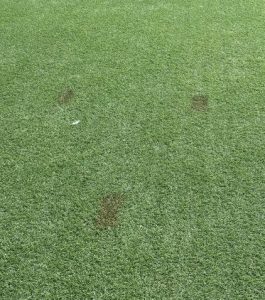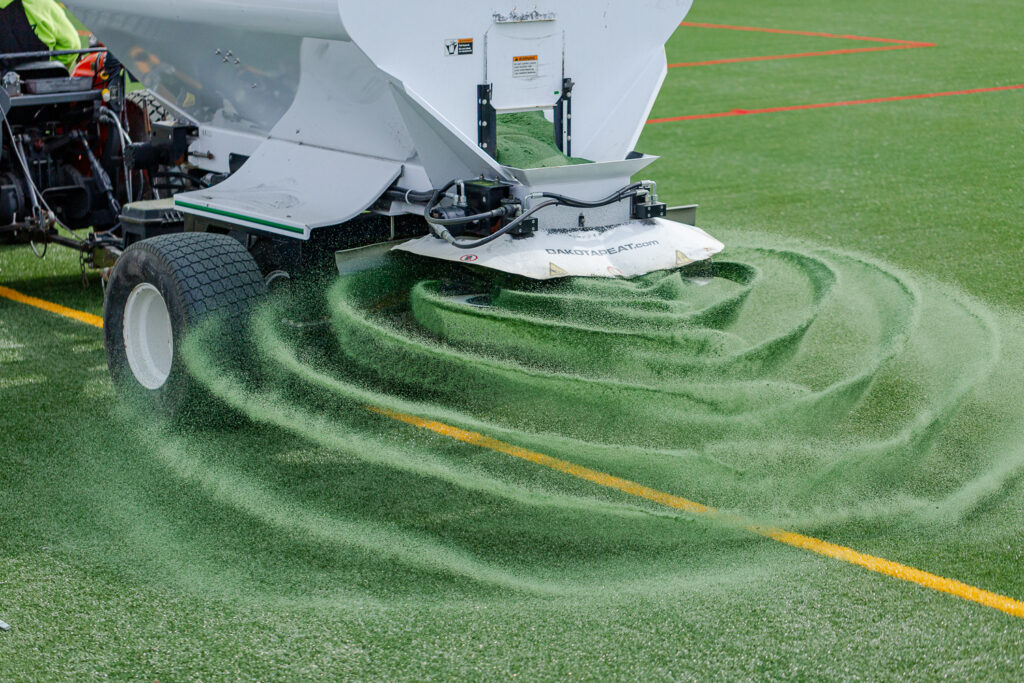
Sports Field Blog
Subscribe To Email Updates
Subscribe to our weekly newsletter and we’ll send updates straight to your inbox
How to Remove Stains from Synthetic Turf

Most synthetic turf fibers are engineered and designed to be stain resistant. The majority of stains that appear on a turf field are actually residue of foreign matter that must be promptly and thoroughly removed. It’s important to remove any stain to insure your artificial turf field isn’t negatively impacted, from both an aesthetic and performance standpoint.
Turf surfaces provide good resistance to staining. However, it is important to realize they are only one part of a sophisticated system of various components designed for overall field performance. Some cleaning agents that are safe for the fiber can be harmful to other components of the system.
NYLON FIBERS
Cleaning agents are grouped into two sets, one of which can be used in liberal amounts directly on the turf surface, and the second which should only be applied by rubbing a white cloth soaked in cleaner, in order to minimize penetration of possibly harmful agents below the turf fibers. In the first group of cleaners, which generally can be applied to non-infilled systems without any special precautions, are the following:
- A warm, mild solution of granular household detergent such as Tide or ALL in water, or any neutral low sudsing detergent that is recommended for fine fabrics. Use approximately one teaspoon of detergent to one pint of water. This will handle most stains.
- Use 3% solution of ammonia in water for more severe cleaning problems. (NOTE: household ammonia is three percent. Industrial aqua ammonia is 33%. Dilute nine parts water to one part industrial ammonia, or the available supply as appropriate.) Thoroughly flush the surface and rinse with plenty of cold water afterwards.
- Clean, dry absorbents such as paper towels or commercial kitty litter can be used for applicable stains.
Any other cleaners must be applied sparingly, and care must be taken to avoid penetration beneath the turf fibers. We recommend consulting a professional for application instructions.
POLYPROPYLENE & POLYETHYLENE FIBERS
Polypropylene & polyethylene fibers are among the most stain resistant fibers known to man. Hence, most stains on Motz polypropylene and polyethylene fields are actually residues of other matter that should be promptly and thoroughly removed. (This is not the case with nylon and other fibers on the market.)
Most stains on polypropylene or polyethylene fields can be removed with soap and water, and can be classified as “waterborne stains.” These include things like drinks (pop, Gatorade, etc.), urine, latex paint, or glue. As mentioned previously, the first rule is promptness. It is much easier to clean up a fresh oil spill before it has time to dry and harden.
- Brush the residue with a stiff brush
- Scrub the area with soap and water
- Rinse the area thoroughly with clear water to remove all traces of soap
- Dry with absorbent towel(s), if necessary
Dry absorbent clay-based materials, such as cat litter absorbers (kitty litter) can be very useful and should be stored on site. Such dry absorbers can be swept or vacuumed up.
The first group of cleaners can generally be applied to infilled systems without any special precautions.
Any other cleaners should only be applied by rubbing a white cloth soaked in the cleaner, in order to minimize penetration of possibly harmful agents below the turf fibers. With more substantial stains like asphalt, oil, grease, or wax, we recommend discussing a solution with a professional prior to application.
If you’d like to consult with a maintenance professional before removing any stain from your turf field, please contact our Turf Care Experts to ensure it is done properly before adversely affecting the fibers.
Similar Blogs



